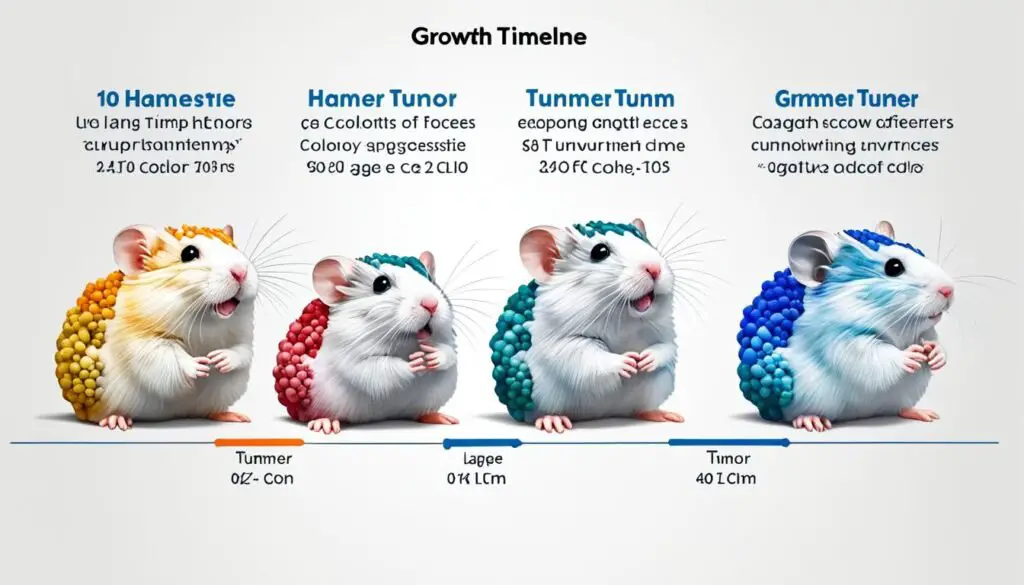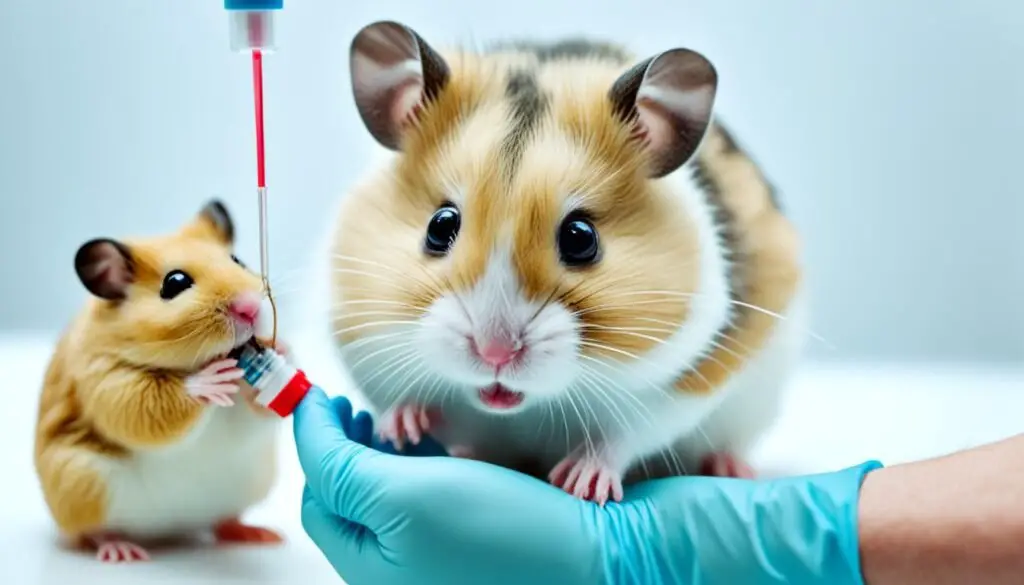Did you know that hamsters can develop tumors in various organs, with skin tumors being the most common?
These tumors can have a significant impact on a hamster’s lifespan, depending on their type and stage. If you’re a hamster owner, you may be wondering, how long can a hamster live with a tumor? What is the life expectancy for hamsters with tumors? And how can you ensure the health and survival of your furry friend?
In this article, we’ll explore the lifespan of hamsters with tumors, the factors that influence their health and survival, and the available treatment options. Let’s dive in and uncover the secrets to managing tumors in hamsters.
Causes of Tumors and Cancers in Hamsters
When it comes to tumors and cancers in hamsters, various factors can contribute to their development. These factors range from genetic predisposition to environmental influences.
- The most common type of benign tumors in hamsters are found in the thyroid and adrenal glands, leading to hormonal imbalances and associated symptoms.
- Malignant skin tumors account for up to 90% of observed cancer cases in hamsters. These tumors can be quite aggressive.
While the specific causes of tumors in hamsters remain unknown, abnormal cell programming resulting in cell overgrowth is believed to play a significant role.
As a responsible hamster owner, it’s crucial to be aware of the potential risk factors and take steps to minimize them. Providing a healthy diet and avoiding exposure to carcinogens can contribute to reducing the likelihood of tumor development.
To learn more about hamster tumor growth timeline, pet hamster tumor prognosis, and hamster tumor treatment options, continue reading.

Diagnosis of Tumors and Cancers in Hamsters
Diagnosing tumors and cancers in hamsters requires a thorough examination by a veterinarian. When you suspect that your hamster may have a tumor or cancer, it’s important to seek veterinary care as soon as possible.
The vet will visually examine your hamster, looking for any visible skin growths or abnormalities. Additionally, they may need to perform further tests to confirm the presence of a tumor. Two common diagnostic procedures for hamster tumors are fine needle aspiration and biopsy.
In fine needle aspiration, the vet will use a needle and syringe to extract cells from the tumor. These cells are then examined under a microscope to determine if they are cancerous or benign. This procedure is minimally invasive and allows for a preliminary analysis of the tumor. However, if the sample size is not sufficient or the tumor is in a deeper location, a biopsy may be necessary.
A biopsy involves obtaining a larger tissue sample from the tumor for more detailed analysis. This can provide valuable information about the type and stage of the tumor, which is essential for developing an appropriate treatment plan. Biopsies are typically performed under anesthesia to ensure the hamster’s comfort during the procedure.
Early detection and diagnosis of tumors in hamsters can significantly improve the chances of successful treatment. Remember to consult with a veterinarian if you suspect your hamster may have a tumor or cancer. They are the best equipped to provide the necessary care and support for your furry friend.
Treatment of Tumors and Cancers in Hamsters
The treatment of tumors and cancers in hamsters is dependent on the type, stage, and location of the tumor. When a solitary skin tumor is small and not impacting vital structures, surgical removal may be recommended to prevent further spread. For hamsters with tumors that cannot be surgically removed, chemotherapy and radiation therapy are alternative treatment options.
Chemotherapy involves the administration of medications to kill cancer cells and inhibit tumor growth. This treatment option is commonly used when tumors have spread to multiple areas or when surgery is not feasible. On the other hand, radiation therapy utilizes targeted radiation to destroy cancer cells and shrink tumors. It is often used to treat localized tumors, particularly those in sensitive areas where surgery may be challenging.
When caring for a hamster with a tumor, it is essential to work closely with a veterinarian to determine the most suitable treatment plan. Consideration should be given to the expected survival rates and potential side effects of the different treatment options. Your veterinarian will evaluate various factors, including the hamster’s overall health, tumor type, and prognosis, to help guide treatment decisions.
Throughout the treatment process, it is crucial to provide your hamster with proper care and support. This includes:
- Keeping their living environment clean and comfortable to promote healing
- Providing a balanced and nutritious diet to support their immune system
- Monitoring their behavior and well-being closely for any changes
- Administering medications or treatments as instructed by your veterinarian
Regular follow-up appointments with the veterinarian are important to assess the progress of the treatment and make any necessary adjustments. Open communication with your veterinarian will ensure that your hamster receives the best possible care throughout their tumor treatment journey.

Recovery and Management of Tumors and Cancers in Hamsters
After the surgical removal of a tumor in your hamster, it is essential to provide them with a period of recovery. During this time, their activity may need to be restricted to prevent any strain on the surgical site, and their diet may be adjusted to support healing.
If your hamster is undergoing chemotherapy or radiation therapy, it is important to be aware that they may experience side effects. These side effects can vary but may include nausea, loss of appetite, or changes in behavior. Providing ongoing monitoring and supportive care, such as ensuring they are comfortable and providing any recommended medications, can help manage these side effects and ensure your hamster’s well-being throughout the treatment process.
As a responsible hamster owner, it is crucial to follow your veterinarian’s instructions for the care and management of your hamster’s tumor. They will be able to guide you on the specific post-operative care, potential side effects, and any necessary ongoing monitoring. Regular check-ups are vital to detect any signs of tumor recurrence or complications early on, allowing for prompt intervention and treatment adjustments if needed.
The recovery and management process for tumors and cancers in hamsters can be challenging, but with proper vet care and your dedication, you can provide your furry friend with the best possible support for their health and well-being.
Hamster Tumor Management Tips:
- Follow your veterinarian’s post-operative care instructions closely.
- Monitor your hamster’s behavior, appetite, and overall well-being for any changes.
- Provide a comfortable and quiet environment for your hamster to recover in.
- Offer a well-balanced and nutritious diet to aid in the healing process.
- Administer any prescribed medications as directed by your veterinarian.
- Stay in regular communication with your veterinarian and attend scheduled check-ups.
Conclusion
Tumors in hamsters can have a significant impact on their lifespan, depending on the type and stage of the tumor. While hamsters with benign tumors may live a relatively normal lifespan, those with malignant tumors may have a shorter life expectancy.
Early detection, accurate diagnosis, and appropriate treatment are crucial in improving the prognosis for hamsters with tumors. It is important for hamster owners to consult with a veterinarian who can provide guidance on managing their pet’s tumor and offer the best possible care and support.
Remember, detecting tumors in hamsters at an early stage can greatly increase the chances of successful treatment and a longer life expectancy for your furry friend.
